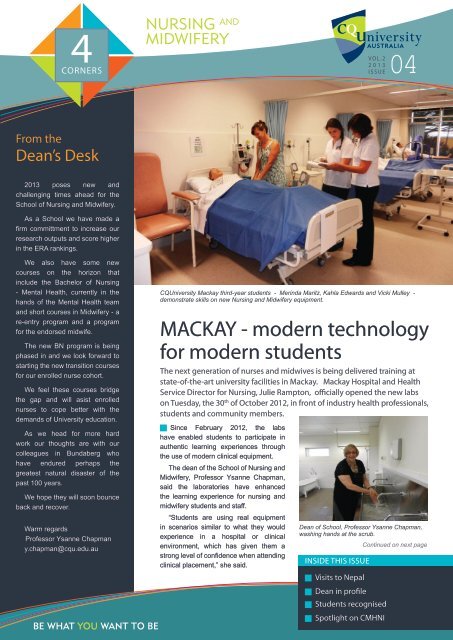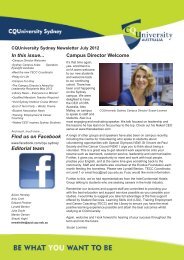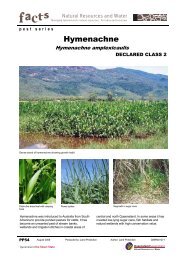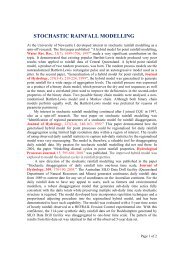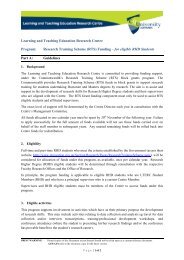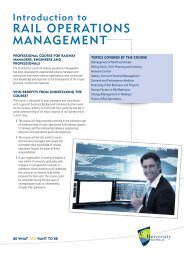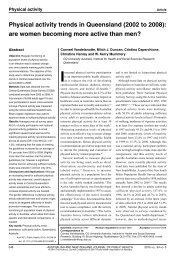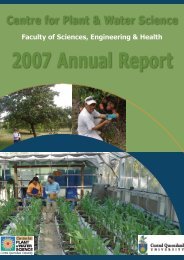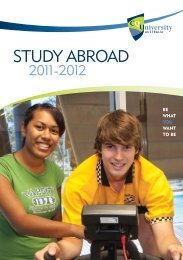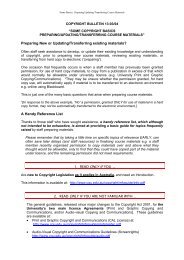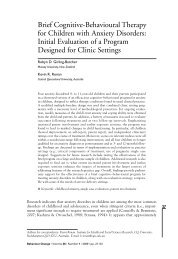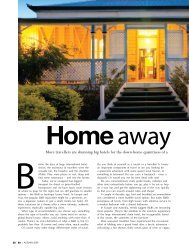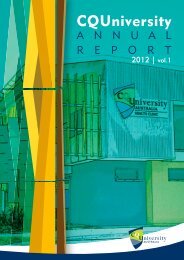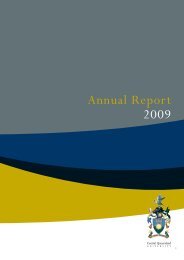4 Corners Newsletter - Vol 4 - Central Queensland University
4 Corners Newsletter - Vol 4 - Central Queensland University
4 Corners Newsletter - Vol 4 - Central Queensland University
- No tags were found...
Create successful ePaper yourself
Turn your PDF publications into a flip-book with our unique Google optimized e-Paper software.
4CORNERSVOL.22013ISSUE04From theDean’s Desk2013 poses new andchallenging times ahead for theSchool of Nursing and Midwifery.As a School we have made afirm committment to increase ourresearch outputs and score higherin the ERA rankings.We also have some newcourses on the horizon thatinclude the Bachelor of Nursing- Mental Health, currently in thehands of the Mental Health teamand short courses in Midwifery - are-entry program and a programfor the endorsed midwife.The new BN program is beingphased in and we look forward tostarting the new transition coursesfor our enrolled nurse cohort.We feel these courses bridgethe gap and will asist enrollednurses to cope better with thedemands of <strong>University</strong> education.As we head for more hardwork our thoughts are with ourcolleagues in Bundaberg whohave endured perhaps thegreatest natural disaster of thepast 100 years.We hope they will soon bounceback and recover.Warm regardsProfessor Ysanne Chapmany.chapman@cqu.edu.auCQ<strong>University</strong> Mackay third-year students - Merinda Maritz, Kahla Edwards and Vicki Mulley -demonstrate skills on new Nursing and Midwifery equipment.MACKAY - modern technologyfor modern studentsThe next generation of nurses and midwives is being delivered training atstate-of-the-art university facilities in Mackay. Mackay Hospital and HealthService Director for Nursing, Julie Rampton, officially opened the new labson Tuesday, the 30 th of October 2012, in front of industry health professionals,students and community members. Since February 2012, the labshave enabled students to participate inauthentic learning experiences throughthe use of modern clinical equipment.The dean of the School of Nursing andMidwifery, Professor Ysanne Chapman,said the laboratories have enhancedthe learning experience for nursing andmidwifery students and staff.“Students are using real equipmentin scenarios similar to what they wouldexperience in a hospital or clinicalenvironment, which has given them astrong level of confidence when attendingclinical placement,” she said.Dean of School, Professor Ysanne Chapman,washing hands at the scrub.Continued on next pageINSIDE THIS ISSUE Visits to Nepal Dean in profile Students recognised Spotlight on CMHNI
LABS Continued from previous pageThe labs have been set up to replicate a clinical environmentand consist of an open plan training space with eight nursingbeds at one end. It also incude a bathroom-equpped trainingspace and three beds for high-fidelity manikin simulations atthe other end, with a compact store area centrally locatedbetween the two spa5ces to service both.The new facilities also include mannequins, scrub andnursing stations, hoists, IV pumps, syringe drivers, ECGmachines, a simulation viewing room, a birthing bath and twobirthing beds.Above: Nursing beds with mannequins and medical equipment thatreplicates a real life environment. Below: Nursing station, scruband bathroom area.“These resources are vital and will enable us to producepassionate nurses and midwives for this region,” ProfessorChapman said.Ms Rampton said she was delighted to be officiallyopening the facility and was looking forward to continuing thepartnership with CQ<strong>University</strong>’s students and graduates.“The new labs are a wonderful place for students to learnnew skills and prepare them for a career in the health industry,”Ms Rampton said.“We are proud to be working with CQ<strong>University</strong> to grow theregion’s next generation of nurses and midwives.”Head of Campus in Mackay, Professor Pierre Viljoen saidstudents in the region were beginning to see the benefits ofstudying at CQ<strong>University</strong>.Right: Professor Chapman demonstraties the working of the bithingbath. Below: Nursing station, scrub and bathroom area.“Quality learning resources and facilities like the newNursing and Midwifery labs are vital for such a fast-growing<strong>University</strong> in a region like Mackay - we need to provide modernstudents with the best learning experience possible.”Left: One of themannequins availablein the laboratory.Right: Third year students,Merinda, Kahla and Vicki,at work in the viewing room- enhanicing their practicalskills in the purpose-builtlaboratory.2
800 Villages attend CQUni healthchecks in rural NepalCQ<strong>University</strong> recount of Health Camp at Gilung (posted by Antipodeans Abroad)On Friday the 23rd of November a group of 12 members from CQUniniversity travelledwith Sonam and Mr Galypo via 4WD for a very bumpy 6 hours to the remote village of Gilung.The welcome by the village was amazing. We were showered with marigold garlands,blessed with a tikka, and we were piped up to the primary school by the village band. Uponreaching the top of the village we were in awe of the amazing views of the AnnapurnaRanges. We were greeted by the elder of the village, together with the primary studentsand teachers.Following a welcoming ceremony by the Lions Club members, school principal and villageelder, we were treated to Nepalese bread and chicken. We then presented the school witheducational supplies, sporting and craft goods.After the presentation we viewed the refurbishments made to the school building andclassroom furniture. We were impressed by the improvements made to the classroomutilising money donated by CQUni and we appreciated the acknowledgement of the CQUnibranding on the school desks which will be an ever-lasting reminder of the donations fromthe most esteemed CQUni students and staff.We were introduced to our host families and settled into our traditional Nepaliaccommodation. We were most impressed by the hospitality shown to all of us and thatevening we enjoyed a cultural show and got to sample the traditional Nepali millet wine.After a delicious breakfast of boiled eggs and roti, we trekked through the fields of milletto the health camp, which was held at the secondary higher school. The day was a greatsuccess with just under 800 villagers came to the camp for health checks, with some walkingup to 5 hours to get there.Health checks included gynaecology, ENT, ECG, Ultrasound, general medicine and eyeclinic. There was also a pharmacy that supplied the necessary medication free of charge.Nursing students were divided between each area providinginvaluable assistance to doctors and performing health assessmentfor patients prior to seeing the doctors. Twenty seven villagers werediagnosed with cataracts out of 250 eye checks. One of these elderlypatients (84 years of age) arrived having been carried in a basket by oneof her family members, over rough hilly terrain to get there.We appreciated the assistance of the Lions members as translatorswhen we communicated with the local villagers. At the completion ofthe health camp, CQUni students gifted donations to the principal of thesecondary school.Following the health camp the youth and women’s groups treatedus to another evening of cultural dance. Dances were also performedby CQUni and Lions Club members, special mention must go to theMost Respected President of the Lions Club for his nimbleness on thedancefloor.The next morning began with a very early start in which our host families bid us farewellwith beautiful garlands and flowers and accompanied us to the bus.As we travelled down the mountain to return to Pokhara we reflected on our experiences,the people we met and new friends we made…“When comparing another country’s healthcare system and cultural norms withour own we deduced the following: ‘it’s not right, it’s not wrong, it’s just different’.”- Caryl Turpin, Mackay nursing student after the third annual Student Midwifery and Nursing Placement to Nepal in 2011,organised by the <strong>University</strong> in conjunction with Antipodeans Abroad.4
Nurturing Nepal Every year, as part of the curriculum, a contingent of CQ<strong>University</strong>Nursing and Midwifery students participate in a clinical placement projectworth 40 hours in a remote community in Nepal, where they lend a hand ata local hospital, rural health camps and outreach clinics.In 2012, Rebecca Clarke joined theproject that is coordinated via AntipodeansAbroad.Apart from contributing their skills thestudents also deliver donations of medicalequipment and supplies. They engage withNepalese nursing students during lecture/discussion forums and participate in healthcamps by taking blood pressure, pulseand respirations, with the opportunity todiscuss cases with the presiding doctor.They get the opportunity to visit and talkto patients in the local health programsand to research ailments that have beeneradicated in the western world.Rebecca ClarkeRebecca has been looking forwardto the opportunity to help people in adeveloping nation who have limited accessto advanced health care services andfacilities.“Their situation is in stark contrast tothe healthcare available to us in Australiaand will require better use of our personalskills and the available provision to delivereffective health services,” she said.The group of students have beenraising funds and resources from localbusinesses and organisations to distributein the local communities.Rebecca said her favourite aspects ofthe Nursing program include learning andpractical development of medical skills,along with the patient contact which canspan from debilitating injury or illnessthrought he procedural and rehabilitationstages to recovery.“A career in Nursing also providesthe opportunity to work in a variety ofenvironments with diverse clients andpresenting issues all within the oneprofession.”In 2011, another nursing student,Sherrie Lee, was one of 18 students andthree lecturers who travelled to Nepal.She outlined the advantages of providinghealth care and assistancce in a thirdworld country and the learning experiencesof students as a result of that mission andwas awarded a community engagementhonour at the Vice-Chancellor’s StaffAward (Opal Award) for her role in theproject.In 2012 the Opal Awards were extendedto the student cohort with a new category- Student Service Learning - representingthe growing number of community-mindedstudents across the <strong>University</strong>.Pro Vice-Chancellor (Community &Engagement) Professor Pierre Viljoen saidCQ<strong>University</strong> aimed to encourage andacknowledge students for their hard workin supporting community developmentthrough projects related to their studies.Vice-Chancellor Professor Scott Bowmancongratulates Sherrie Lee and the Nursingand Midwifery team for their project in Nepal.Nursing student Patricia Callow was also one of the first students to beawarded a community engagement honour at the Vice-Chancellor’s Staff Awards, 2012.Patricia was nominated by her supervisor and mentor, Kathryn Dougan, Nurse UnitManager at the Mackay Base Hospital, recognising her project ‘Clinical Handover at theBedside - Rehab Unit’.During her work as a Medication Endorsed Enrolled Nurse in the Rehabilitation Unit,Patricia researched the clinical handover at the bedside process as an academicassignment and identified the gaps in current clinical practices. She went on to seeksupport, carried out group discussions and consultations and was able to put together aresource guide to improve the process for other nurses.Journal Articles Birks, M, Cant, R, James, A,Chung, C & Davis, J 2012, 'The useof physical assessment skills byregistered nurses in Australia: issuesfor nursing education', Collegian,online 23 March 2012. http://dx.doi.org/10.1016/j. Cleary, M, Horsfall, J & Happell,B 2012, 'Promoting mental healthnursing: employing undergraduatenursing students as assistantsin mental health', InternationalJournal of Mental Health Nursing,vol. 21, no.1, pp. 69-74, http:dx.doi.org/10.1111/inm.2012.21.issue-1. Hall, S 2012, 'Quality and equity incancer care: how can we be sure?',Austral-Asian Journal of Cancer, vol.11, no 2 , pp.77-78. Happell, B, Hoey, W & Gaskin,CJ 2012, 'Community mental healthnurses, caseloads, and practices:a literature review', InternationalJournal of Mental Health Nursing,vol. 21, no. 2, pp. 131-137, http://dx.doi.org/10.1111/inm.2012.21.issue-2 no. 2, pp. 247-257. Happell, B, Reid-Searl, K, Dwyer,T, Caperchione, CM, Gaskin, CJ &Burke, KJ 2012, 'How nurses copewith occupational stress outside theirworkplaces', Collegian, http://dx.doi.org/10.1016/j.colegn.2012.08.003colegn.2012.02.004. Happell, B, Scott, D, Platania-Phung, C, Nankivell, J 2012, 'Ruralphysical health care servicesfor people with serious mentalillness: A nursing perspective',Australian Journal of Rural Health,vol. 20, no. 5, pp. 248-253,http://dx.doi.org/10.1111/j.1440-1584.2012.01303.x. Happell, B, Scott, D, Platania-Phung, C & Nankivell, J 2012, 'Shouldwe or shouldn’t we? : mental healthnurses’ views of physical healthcare of mental health consumers',International Journal of Mental HealthNursing, vol. 21, no. 3, pp.202-210,http://dx.doi.org/10.1111/j.1447--0349.2011.00799.x. Hunt, GE, Happell, B, Chan, SW,Cleary, M 2012, 'Citation analysis ofmental health nursing journals: Howshould we rank thee?', InternationalJournal of Mental Health Nursing, vol.21, no. 6, pp. 576-580, http;//dx.doi.org/10.1111/inm.2012.21.issue-6. Scott, D, Burke, K, Williams,S,Happell, B, Canoy, D & Ronan,K 2012, Increased prevalence ofchronic physical health disorders inAustralians with diagnosed mentalillness, Australian and New ZealandJournal of Public Health, vol.36, no.5,pp. 483-486, http://doi.dx.org/10.1111/j.1753-6405.2012.00916.5
Professor Ysanne Chapmandoes not waste time. Her mainresearch areas of interest atpresent are diabetes and themanagement of pump therapyfor adults; diabetes and itsmanagement and responses tofluctuating seasonal changes inHbA1C values; spirituality and itsplace in nursing; teaching scholarsand their role.As a teacher of nursing she doessessional work in the areas ofdeath and dying, communication,nursing image, and the changes innursing work.She also has a number of PhD/Masters students that she is cosupervisingwith staff in the Schoolor at other Universities. Ysanneis currently finishing off writingthe second edition of Communityas Partner and involved in coauthoringthree new textbooks.As an academic she is constantlypublishing in professional journals;marking higher degree candidateswork from other Universitiesand am a regular reviewer for anumber of journals and researchgranting bodies plus being aninvited speaker at conferences orother professional occasions.When Ysanne first started herrole at CQUni she was quitesurprised by the enthusiasm andinvolvement of the Vice Chancellorin the day-to-day activities of the<strong>University</strong>.“At other Universities where Ihave worked the VC has remainedaloof and impervious to dailyactivities,“ she said.As Dean of School Ysannestrives towards successfulsuccession planning; an increasein our ERA rankings; and transitionto dual sector.For the future, she envisions theexpansion of <strong>Central</strong> <strong>Queensland</strong><strong>University</strong> to be not only thenation’s fastest growing <strong>University</strong>,but maybe the worlds?“Education will becomebetter linked to communityneeds, and will openopportunities for manypeople who thought theywould never aspire toa <strong>University</strong> career or aplace at <strong>University</strong>”.Ysanne growing a picture at CQUniWhat does Martin Heidegger, Josephine Paterson and Loretto Zherad, Hildegard ofBingen and Jeffery Archer have in common? They would be invited guests at theDean's dinner table and talk about Being and Time, humanistic nursing, what it is likebeing a women and a leader in society, and how to write ‘trashy’ books. Professor Ysanne Chapman, Deanof the School for Nursing and Midwifery,has been in the position since September2010. She manages and leads a team of 39academics and 19 professional staff acrossthe School (located across 4 campuses -Mackay, Rockhampton, Bundaberg, Noosa– and an outreach location, Emerald.Ysanne represents the School on internaland external committees and serves on theEthics Committee of the <strong>University</strong>. Sheresearches and teaches a little.“For nearly all of my career I havewanted to teach as well as nurseand I fell into teaching relativelyearly in my career in Australia”.She was a clinical educator in a fewhospitals plus each of her substantiallyclinical positions featured education in someway. Before taking up the Dean’s position atCQUni, she had been at Monash <strong>University</strong>,Gippsland campus: firstly, as a SeniorResearch Fellow, then Senior Lecturer andthen as an Associate Professor.Ysanne designed the Bachelor of NursingPractice degree and was the coordinator ofthe program for five years. She also taughtthree courses per year; was involved inrural and workforce research; researchinto education, published prolifically andsupervised several PhD and Mastersstudents. Before that she worked at Flinders<strong>University</strong>; The <strong>University</strong> of Tasmania andthe <strong>University</strong> of New England.As a child, she and her parents movedaround a fair bit, but for the first nine yearsof her life, she and her devoted parents livedin North London, England in a place calledNew Barnet.“I was a social child and my mother wouldoften comment that I would strike up aconversation with anyone on the bus”, shesaid.Her father was a cinema manager andworked odd hours, but Sunday morningswere their time together. They would visit hisallotment and till the soil - he grew fantasticstrawberries as well as great vegies. Thenthey would return home, change into theirSunday best clothes and go to church.“There were about five churches in theneighbourhood and my dad would pop intoeach of them to assess which one had thebest hymns - he loved a good singsong”,she said. He passed away 33 years agoand is dearly missed.Due to his occupation, she was luckyenough to see lots of films and meet a fewstars – Jeanette Scott, Roger Moore, LionelJefferies, Syd James and Eric Moorcombe.As a typical teenager, she enjoyed themusic of the time – at first it was peoplesuch as Dean Martin, Max Byegraves andlater, Elvis Presley, The Beatles, The RollingStones.Heroes from her childhood were ‘Katie’in the What Katie did at School books;Winston Churchill and his political fame;Miss Phillipson – her geography teacherat Windsor High School who taught herall about the geographical features of theMurray-Darling basin and bore water andput the idea firmly in her mind to come toAustralia one day.After finishing High School in Windsor,Berkshire, she started nursing in 1966 inLondon England and came to Australia in1970 as a very novice registered nurse.From 1997-1999 she took up a full timescholarship to start and finish her PhD.“It was undoubtedly one of thebest times of my life – being a fulltime student at the age where Icould appreciate it!”Throughout her young life, her parentshad the greatest influence on her.“My mum was a nurse and although shewas keen for me not to become one – herstories penetrated my being and I wanted tofollow in her footsteps,” she said.Her mother told her many tales of her lifeas a nurse in World War II.“She would not hide anything inher stories – the blood and thunderas well as the fun and laughter wereshared - I gleaned a very balancedview of what it was like to livethrough this challenge”.6
“Throughout my academic career I havebeen fortunate to work with some stellarperformers,” she said.Judith Clare, an ex Head of School ofFlinders <strong>University</strong>, originally from NewZealand, made quite an impact at Flinders.She developed their higher degree byresearch program, instigated a uniqueway of sending off theses to be marked,allowed Ysanne to run with new ideas aboutcurriculum building and was supportive tostaff who put in those extra yards requiredto make a good career.Alan Pearson, Director of Joanna BriggsInstitute and ex Head of School at <strong>University</strong>of New England (UNE), taught me how tobe tough but fair, understanding but focusedand how to work with change. He pioneeredthe idea of research school in Australia andYsanne was part of the many groups of PhDstudents that he saw through their studies.Sally Borbasi, now at Australia Catholic<strong>University</strong> in Brisbane, her clear insightsinto phenomenology, the value of quality inteaching and learning and how to achievea good work-life balance (or at least try to).Margaret Dunlop, retired Head of School– ex UNE and ex Griffith <strong>University</strong>, taughtYsanne the value of reading, of writingpoetry and of being her own person.Ysanne believes that she can helpbuild capacity in staff and guide them tobe leaders. The guidance she offers caneventually change practice or at leastimprove circumstances for the people thatnurses care for or work with.Watching and seeing the changes inhigher degree students’ capabilities andsharing in their successes at graduation andpublication of their ideas are the culminationof hard work and dedication.“I enjoy seeing the faces of peoplewho succeed in what they do –either a staff member in their work,or a student in their understandingof a concept”, she said.Although her job constantly throws upchallenges, all of them enhance her growingacademically, socially and spiritually.What she likes the least about her positionis disruptions to collegiality within the Schooland students making unfair accusationsagainst staff.She also regrets saying goodbye to fourexceedingly talented senior staff within thewider <strong>University</strong> in 2012.On the other hand, the best thing tohappen since starting to work at CQUniis the rapid increase in staff engaging inresearch and valuing a quality product inour teaching.“I appreciate some of the staffexpressing their desire to reach outto the community and be altruistic”.In her leisure time, she sews for pleasure.“I have 29 unstarted objects (USOs asopposed to UFOs). I make quilts, most ofthem with intricate embroidery that I love tofocus on – growing a picture.” she said!Ysanne has two boys that she lovesdearly and would like to be physically closeto them and spend more time with them andtheir families.“As I approach the ‘r’ time in my lifeI see myself having my grandson tostay throughout the year – spendingtime together exploring all the thingsboys are curious about; sewingfor fun; making quilts for the greatgrandchildren; growing produceand bottling or preserving it; playingBridge occasionally; listening tomusic played loudly; dance; visitmagical places in the world where Ihaven’t been (Prague is first).”Q & AQ. What might your colleaguesat CQUni be surprised to knowabout you?A. I want to be a midwifeQ. Other than a nurse, teacherand possibly midwife, whatelse would you have love tobe?A. As I have aged I would haveloved a career in geography -physical geography - possiblymap making.Q. What one word would youuse to describe yourself?A. FairQ. What one word would yourfriends use to describe you?A. Loyal7
SciVal recognises CQUni as #1 forMental Health Nursing ResearchCQ<strong>University</strong>'s Engaged Research Chair for Mental Health Nursing, Professor BrendaHappell, has been putting Australia on the map in her field. Brenda and her team at the Centre for Mental Health Nursing Innovation (CMHNI) havebeen acknowledged as number 1 in the world for publications relelvant to mental health nursing,cementing a leadership role in this important area of practice.Research efforts of CMHNI focus on evaluation of clinical and behavioural health issues;understanding relationships between clinical, social, and mental health issues to promotepositive change; understanding the psychosocial, cultural and geographical contexts of healthand health-related behaviours; and improving understanding of the implications of clinical andmental health services in relation to mental and psychosocial health needs.CMHNI represents a partnership between the CQ<strong>University</strong>’s Institute for Health and SocialScience Research and School of Nursing and Midwifery and reflects the <strong>University</strong>’s leadershipin mental health nursing research, education and community service.Mental health nursing is a strong focus of the programs, both undergraduate and postgraduate,and include an academic with lived experience of mental health service use.8The Australian College of Mental HealthNurses (ACMHN) recently created 'TheBrenda Happell Award' for the bestpresentation at its annual Consultation-Liaison Special Interest Group Conferencein Melbourne.Professor Happell is an ACMHN Fellowand has served on the Board of Directors.ACMHN says the award was created toacknowledge her contribution to mentalhealth nursing and her support of noviceresearchers and publishers.Professor Happell continues her role asEditor of the International Journal of MentalHealth Nursing, the world's highest rankedmental health nursing journal.She has a distinguished academic careerthat includes more than 180 researchpublications, as well as books and bookchapters. She has worked as a consultantto the World Health Organisation and has animpressive list of national and internationalkeynote speaker invitations.A recent analysis of research citationspublished in the Journal of Clinical Nursingshowed Professor Happell ranking in the'top three' among Australia's leading nursingacademics.During 2012, Brenda was recognised witha Vice-Chancellor's Award for Excellencein Research Higher Degree Supervisionas well as a Vice Chancellor’s Award forOutstanding Researchers in the Excellencein Research Category.The strong academic team - Professor Brenda Happell,Professor Margaret McAllister, Dr Marc Broadbent,Louise Byrne, Chris Platania-Phung and Robert Stanton,is nationally and internationally recognised for innovativeresearch in their focus areas.MENTAL HEALTH EDUCATIONCQUni has won a tender to boost mentalhealth education through an improvednetwork of clinical placements andembedding of a new ‘recovery’ approachamong clinical facilitators.The <strong>Queensland</strong> Health-funded project willenable innovation in mental health servicesto prosper throughout the State.“We will be capacity building clinicalplacements in under-utilised health settingsand engaging with non-traditional mentalhealthcare services, while embedding therecovery approach through education ofclinical facilitators,” Professor Happell said.Lived Experience academic Louise Byrnesays the recovery approach, along withalternative models of clinical practice to thatof traditional healthcare delivery, is integralto the vision for innovative partnershipsin teaching, research and professionaldevelopment in mental health.Associate Professor Mental Health NursingAnthony Welch (Project Leader) says thetender will draw on expertise in projectdesign, implementation and evaluationwithin IHSSR and CMHNI.“Along with our academics within Nursing,Occupational Therapy, Social Work andPsychology our diverse mix of healthprofessions can provide a powerful skill mixand capacity to drive this project forward,”he says.“We will develop a regional mental healthclinical team with representation from thekey stakeholders, to devise a framework formaximising clinical placement allocations.”


